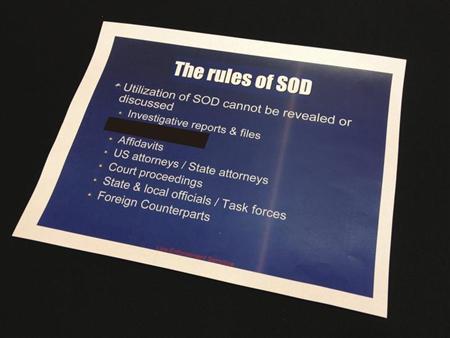You may recall an article I wrote a while back arguing that the NSA’s data collection programs, including PRISM, might well end up being used to prosecute “U.S. persons” for domestic crimes, rather than simply nabbing terrorists (as the government claims is PRISM’s only purpose).
It turns out that this is essentially already happening. Reuters published a story this week about how the DEA’s “Special Operations Division” (SOD) collects data from a vast array of foreign and domestic intelligence agencies, including the NSA, and uses it to target people for law enforcement action. While the NSA intercepts, along with other warrantlessly collected information, are not being used as evidence in court–yet–the government has found another brilliant way to handle the problem: “parallel construction.”
Here’s how it works, according to the Reuters story. Essentially, someone from the SOD will get information from some other agency–say, an NSA intercept–and will tip off a DEA agent to look into a particular person by saying, basically, “This guy’s a drug dealer, trust us.” But the SOD doesn’t want anyone knowing how the SOD knows he’s a drug dealer–because that could be a problem–so the officer is instructed to come up with some other avenue for finding admissible evidence that he’s guilty. This way ,the SOD’s involvement, as well as the underlying information that led them to target a particular person, is never revealed to the courts or the individual’s defense attorneys.
Reuters quotes a former DEA agent as saying, “It’s just like laundering money–you work it backwards to make it clean.” The fancy law enforcement parlance is “parallel construction”–i.e., you construct an entirely new evidentiary trail that takes you exactly where you want to go without revealing what brought the individual to your attention in the first place.
Why should this concern you even if you’re not a drug smuggler? Because, as I argued before, loads of people are guilty of loads of small crimes. When we make virtually everything a little bit illegal, and when prosecutors have complete discretion to decide whom to target for such crimes, it’s the targeting that becomes key. If everyone is downloading JSTOR articles with their uncle’s password or using their in-laws’ HBO GO password, then everyone is potentially at the whim of an overzealous prosecutor.
And, because so much of our information is now neatly collected in government databases and easily searchable, once someone is targeted it’s easy to do the backwards math to find evidence of wrong-doing. Leaving aside the obvious abuses, like targeting people for their political opinions, is it so hard to imagine that zealous law enforcement might become wrongly convinced someone is a terrorist based on their Twitter history or musical tastes, and then go completely nuclear on them for a minor infraction? Is it so hard to imagine someone rationalizing it to themselves as “for the greater good,” like prosecuting Al Capone for tax evasion?
I imagine this is how the DA in the Aaron Schwartz case manages to sleep at night; she’s convinced that over-charging a young man for downloading JSTOR articles prevented some inarticulable greater threat posed by this young “hacker.”
And, is it so hard to imagine that someone seeing snippets of your digital life might possibly get the wrong idea about you?
So long as we can never know what brought someone onto law enforcement’s radar in the first place, we can never challenge it, which may well be unconstitutional. Even DAs are upset, according to the article:
One current federal prosecutor learned how agents were using SOD tips after a drug agent misled him, the prosecutor told Reuters. In a Florida drug case he was handling, the prosecutor said, a DEA agent told him the investigation of a U.S. citizen began with a tip from an informant. When the prosecutor pressed for more information, he said, a DEA supervisor intervened and revealed that the tip had actually come through the SOD and from an NSA intercept.
“I was pissed,” the prosecutor said. “Lying about where the information came from is a bad start if you’re trying to comply with the law because it can lead to all kinds of problems with discovery and candor to the court.” The prosecutor never filed charges in the case because he lost confidence in the investigation, he said.
Let’s all hope that if we end up in the crosshairs, we get this DA. But I wouldn’t count on it.
Christine Clarke is an employment lawyer at Beranbaum Menken LLP in New York City. She has published in Slate and writes an employment law blog at Wage Against the Machine. She’s a regular contributor to the LOTL blog.









